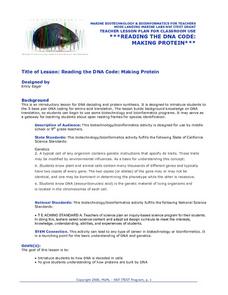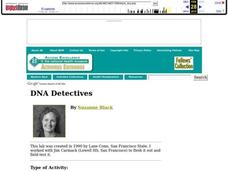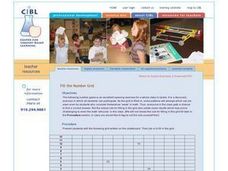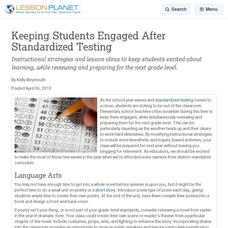American Chemical Society
Joseph Priestley, Discoverer of Oxygen
Do you want to hear a joke about nitrogen and oxygen? NO. We all know there is oxygen in the air and that plants produce oxygen, but how was it discovered? Scholars read a handout, answer questions, and analyze material in the...
National Library of Medicine
Your Environment, Your Health: The Great Debate—Bottled Water vs. Tap Water in Our School
Should bottled water be sold in schools, or should they only provide tap water? The summative unit in the six-part series encourages scholars debating this topic. The lessons teach how to build an argument, how to gain background...
Curated OER
Exploring Magnets and Magnetism
Here is a very good lesson on magnets, magnetism, and magnitic fields that is chock full of great activities for you to implement with your young scientists. Learners discover the properties of magnets, look at the forces of attraction...
Curated OER
Reading the Dna Code: Making Protein
Students study DNA decoding and protein synthesis. They use the amino acid table to translate DNA, break DNA strands into three nucleotide codes, and translate nucleotides into amino acid protein codes. They research the importance of...
Syracuse University
Ancient World Writing System
Most twenty-first century pupils don't know how to interpret cuneiform. Examining images of cuneiform and papyrus writing and using a chart and Venn diagram, young historians extrapolate what life may have been like for people who lived...
Curated OER
History of Coal in the United States
High schoolers examine a timeline of coal mining in the US and research how the policies of coal dependent companies have changes over the last 50 years.
Curated OER
DNA Detectives
In order to understand DNA fingerprinting, advanced biology aces divise a crime scenario and analyze three different samples of lambda DNA. This creative lesson plan provides practice with micropipettes, electrophoresis boxes, and other...
Curated OER
Planet Impact!
An amazing information-packed lesson plan allows your space scientists to crash a virtual comet into Jupiter and learn how the angle, distance, speed, and mass influence the outcome. Click on "Back to the Lesson" to access the...
Curated OER
# 05 Color Me Analytical
High schoolers are introduced to colorimeter on two levels. They investigate how to physically manipulate the colorimeters. Secondly, the students start on a pathway of discovery to one of the most important principles in analytical...
Curated OER
Exploring Mars
Learners, working in small groups construct scale models of the planets and solar system. They examine images of Mars and discuss what might have caused the features. They record facts about their planetary research in their journals and...
Curated OER
Saltwater: Nifty Aqueous Colorful Layers
A classic investigation on the density of liquids is explained for you in this lesson plan. Te begin, you prepare water samples of different salinities and then add different food coloring to keep them separated and easily identified....
Curated OER
Fill the Number Grid
Patterns emerge as the class works together to fill in a number grid. This whole group activity is designed to make all learners feel successful, and ultimately turns into a lesson on the least common multiple.
Teach Engineering
Incoming Asteroid! What's the Problem?
Oh, no! An asteroid is on a collision course with Earth!. Class members must rise to the challenge of designing a shelter that will protect people from the impact and permit them to live in this shelter for one year. In this first lesson...
Curated OER
Density - An Intrinsic Property
Learners discover the property of density while participating in a lab exercise. In this scientific measuring lesson, pupils utilize a scale to measure the density of different metal materials. They document their work and present their...
Curated OER
Build A Borneo Glider!
Young scholars construct a paper glider. In this physics of gliding lesson, students first learn about Borneo and it's rainforest habitat. After young scholars discover the way animals in Borneo glide from tree to tree, they use their...
Curated OER
Be "Sun-sible" about Heating Water
Students create a solar water heater. In this solar energy lesson, students conduct an experiment to determine which colors absorb more radiant heat. Students investigate the relationship of heat loss to insulation. Students then create...
Curated OER
Keeping students engaged after standardized testing
Instructional strategies and lesson ideas to keep students excited about learning, while reviewing and preparing for the next grade level.
Curated OER
Savvy Surfers: Website Evaluation and Media Literacy
Sixth graders strengthen their understanding of what a high quality website is composed of. Learners evaluate three websites for accuracy, credibility, and reliability by completing a chart.
University of California
Hot! Hot! Hot!
Calories are not tiny creatures that sew your clothes tighter every night, but what are they? A science activity, presented at multiple levels, has learners experiment with heat, heat transfer, and graph the function over time. It also...
Civil War
Civil War Medicine: Fact or Fiction
Young historians compare the presentation of medical care during the Civil War in passages from fictional and nonfictional texts. They examine passages from Gone with the Wind by Margaret Mitchell and Soldier's Heart by Gary Paulsen, and...
Towson University
Berries...With a Side of DNA?
Sometimes science lab can be ... delicious! Middle school science scholars extract DNA from strawberries and other fruits in an engaging lab activity. The teacher's guide includes pacing, materials list, and worksheets with answer keys.
National History Day
Why Did the United States Enter World War I in 1917?
World War I was the first major conflict on a global scale. Using primary documents, learners determine why the United States chose to enter World War I when it did. After analytical writing and group research, the causes of America's...
Mascil Project
Circular Pave-Stones Backyard
Pack the lesson into your plans. Young mathematicians learn about packing and optimization with the context of circular paving stones. They use coins to model the paving stones, and then apply knowledge of circles and polygons to...
Syracuse University
Harlem Renaissance
The music and literature of the Harlem Renaissance defined American culture, including its poetry. Using a poem from the period, individuals explore its musical qualities and how it is reflective of the period. Then, they use what they...
Other popular searches
- Inquiry Based Learning
- Inquiry Based Cell Biology
- Inquiry Based Physics
- Inquiry Based Science
- Inquiry Based Math
- Inquiry Based Language Arts
- Inquiry Based Math
- Inquiry Based Learning
- Inquiry Based Instrumental
- Inquiry Based Learning Maths
- Inquiry Based Science
- Inquiry Based Physics Motion

























